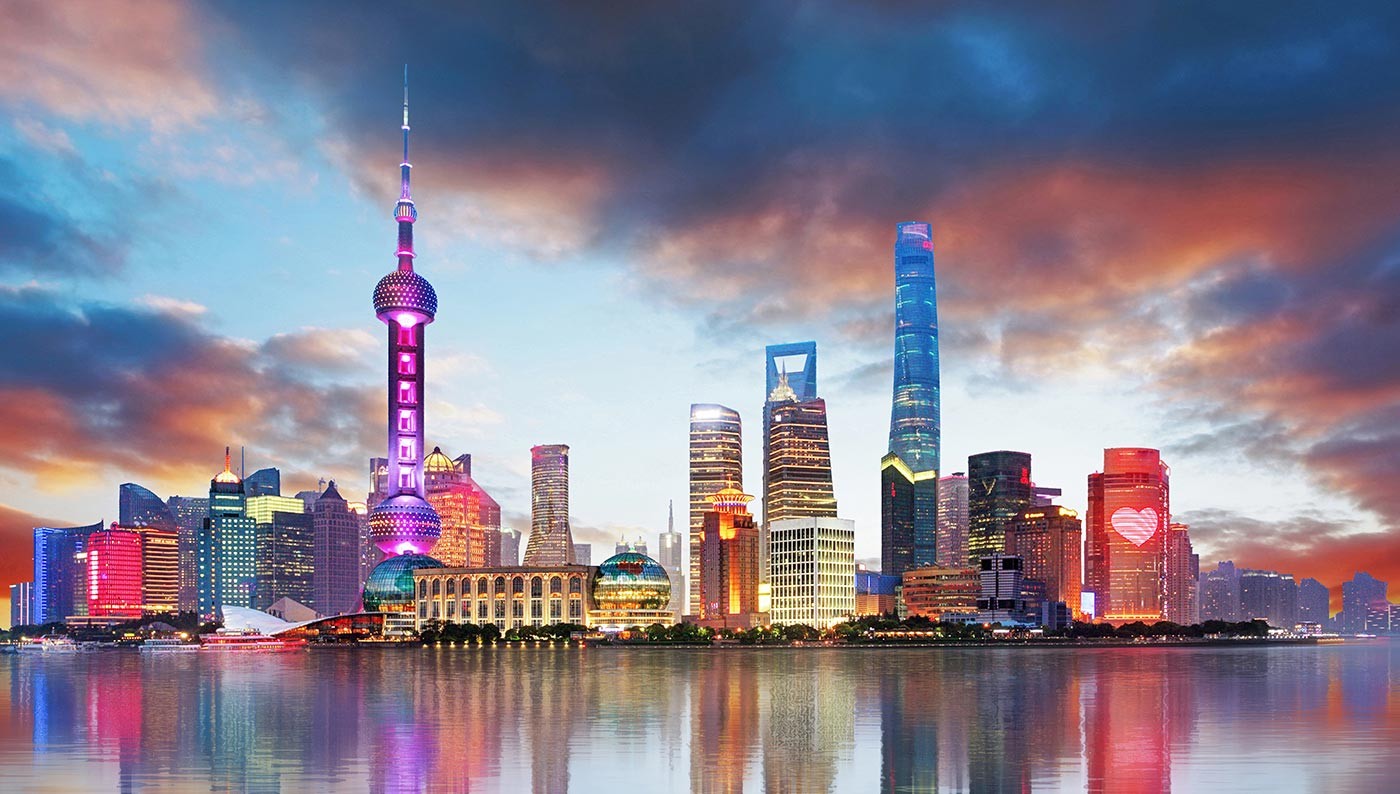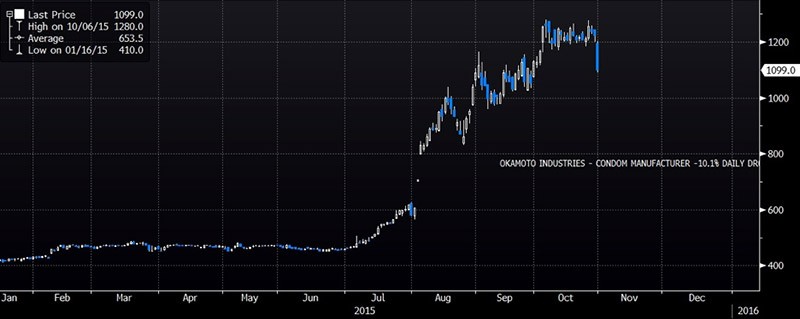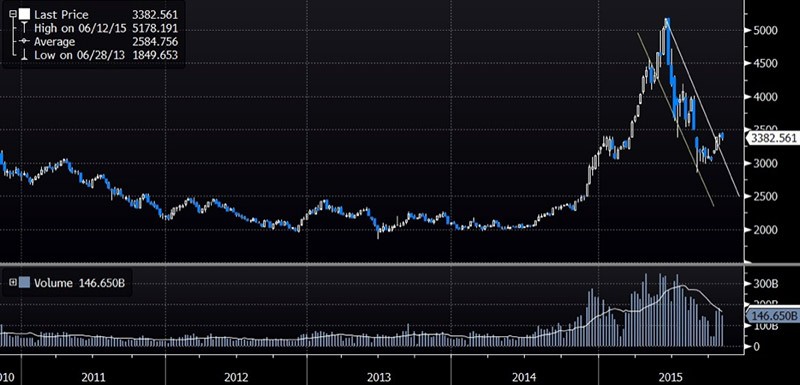China, Shaken But Not Stirred
Reading through a report on China with great alacrity and I was struck by the strategist’s observation that the closer he got to China, the less concerned investors were about the possibility of a hard landing for the place.
Cynics would probably jump on this with the wry comment that perhaps it has to be with the arrests we saw recently where all skeptics were rounded up if they as much utter a word against the state of the economy, and not to mention, the bells of alarm that have been sounded over the years over those economic data reported.
What do we have when we run of things to say? When a country’s stock market rallies 60% in 6 months to collapse 45% in the next 2 for the government to step in with all manners of intervention such as the banning short selling, forced buying, arrests and 6 rate cuts?
What can we say when the country is still on course for an above 6% growth which is not enough for her critics who come from economies running on zero interest rates and disinflationary markets?
Months back, we pointed out about the monkey-trading stock market in China and the monkeys are back! After the 5th plenum of the Communist Party’s Central Committee, China looks promisingly ripe again with a revised growth projection of 6.5% for the next 5 years and a 2 child policy! The monkeys flew into action on Friday, chasing up those “baby related” stocks as far as the imagination would fly, leaving latex birth control manufacturers like poor Okamoto Industries (5122 JT) the logical 10% losers in a single day.
For “baby stocks”, we had the following rallies, just to name a few, and it would seem that the Chinese like Japanese diapers and dislike their condoms.
Pigeon Corp (7956 JT) – baby care, maternity and elder care goods. +10.7%
Unicharm Corp (8113 JT) – sanitary, hygiene and infant care products. +3.59%
China Mengniu Dairy Co (2319 HK) – dairy products. +3.43%
Biostime International (1112 HK) – pediatric nutrition and baby care products. +5.11%
China Child Care Corp (1259 HK) – designs and provides range of children care products. +40%
Kao Corp (4452 JT) – manufacturer of household and chemical products. +3.86%
Yamaha Corp (7951 JT) – manufactures musical instruments, audio and golf equipment. +2.72%
Yet, what about their insurance needs ? China Life Insurance (2628 HK -2.26%) and Ping An Insurance Group (2318 HK +0.11%).
One would be even more amused by the equity market reactions on Tuesday when a US Navy destroyer sailed within 12 nautical miles of one of the Chinese artificial islands in the South China Sea.
Sharp spikes in the prices of defence company stocks were noted during the day for Hong Kong listed Avichina Industry (2357 HK), mainland stocks in Avic Aviation (600893 CH), Avic Helicopter (600038 CH), China Aerospace Times (600879 CH) and more.
On a flight of fancy, it brings to mind Casino Royale, where the famous Bond martini was conceived, it being the first book of the series, to be shaken and not stirred. And Chinese markets have been shaken to no small degree but has bounced back, quite naturally, breaking out of its weekly downtrend channel.
Recognising that there are still 116 stocks (out of 1114) suspended in Shanghai which is about 10% of the market names and that the A shares versus H shares premium is steadily holding above 100%, widening out in the past month against those odds that the ordinary rational investor would care about. The fear of death or greed, or death by greed especially after witnessing August’s meltdown, would add to investor unease, particularly those who are congratulating themselves on having narrowly escaped any losses so far.
In the spirit of Casino Royale, perhaps the time has arrived to play that MSCI card that is an inevitable outcome for the world and its second largest economy – China, or third largest if we consider the Eurozone as one.
The acceptance of the Chinese yuan into the IMF SDR (Special Drawing Rights) basket would be the first sign of approval, albeit an inconsequential one for all economic purposes except that the gesture would speaks volumes in terms of its implication for the things to come – the legitimisation of China into the main indices against its emerging market status right now.
What we wrote in April this year.
“The MSCI World Index is an important benchmark – it covers approximately 85% of the free float-adjusted market capitalization in each country in the index. In a sense the aim is to look the investible universe. The US makes up 50.12% of the MSCI All Countries World Index as at 31 March 2015. If you were to look at the latest fact sheet from the iShares MSCI ACWI ETF country weights, China is only 2.7%.”
The most recent allocations have China down at 1.76% after US 52.09%, Japan 7.84%, UK 6.52%, Switzerland 3.64%, France 3.32%, Germany 3.16%, Canada 2.89% and Australia 2.2%.
The MSCI has resisted Chinese re-weightings wisely after the stock market rout that probably exacerbated the rout into the full blown tragedy we saw in August.
The other index provider, the FTSE, had gone ahead earlier in March this year to “Sinophi-lise” their indices.
When a market is shaken but not stirred, we have sentiments on our side. People ran scared and are under-invested even if many are still stuck in their bond positions which has been a painful lesson in liquidity estimation that is now looking like it is not limited to just China as the rest of the world such as Singapore realise the difficulty of unwinding a bond trade.
The Chinese yuan’s largest one day gain on Thursday has been a confidence booster even as consumer confidence in the US sinks, US GDP numbers wane and economic surprise indices sink into negative zones which makes China not look too bad if they will deliver 6.5% economic growth for the next 5 years with a currency growing in global acceptance.
In fact, it would not be too bad at all when the market monkeys realise that they left out the insurance company stocks in their “2 child policy trades” or even the real estate companies that would be required to house those extra babies when they are grown.




